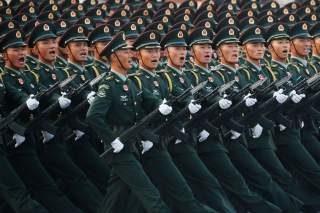Scandal: These Chinese Officers Paid to Become Generals
And Beijing isn't happy.
Key point: This kind of corruption hurts military readiness and morale.
When dozens of senior officers are punished for bribing their way into promotions, you know that the Chinese military has a corruption problem.
More than 70 serving and retired senior People’s Liberation Army officers have been demoted for pay-for-promotion, according to the South China Morning Post. The list includes a full general and two lieutenant generals.
The officers were connected to former PLA chief of joint staff Fang Fenghui. Fang was convicted in February of taking bribes, and sentenced to life in prison. In turn, Fang was connected to Guo Boxiong and Xu Caihou, former vice-chairmen of the Central Military Commission, which oversees China’s military on behalf of the Communist Party. Guo and Xu had been earlier punished for corruption.
Most of the demoted senior officers were political commissars or held logistical positions, a retired naval officer told the Post. “The latest penalties were lenient,” he said. “None of them were sentenced to jail because they were seen as underlings of Fang, who was Guo and Xu’s protégé.”
“Among the officers, 44 of them belonged to the Beijing Military Command where Fang was the commander from 2007 to 2012,” another source told the Post. ““They were found guilty of bribing Fang in exchange for promotions. Others were former subordinates who offered Fang bribes when he was promoted to chief of joint staff.”
China’s military has come a long way since the mass peasant armies of the Cold War. Its doctrine has embraced Western-style high-tech war, and its weaponry, from stealth fighters to missiles, is edging closer to American capabilities.
But the Achilles heel of the People’s Liberation Army remains corruption. “Paying bribes to more senior officers for promotions seems to be commonplace,” notes one commentary. “Payments are also frequently required for enlistment in the People’s Liberation Army, or for ensuring good results in entrance exams, especially in rural areas where the military may be regarded as a promising career option and a route out of poverty. One journalist purportedly seeking admission to the PLA for their son was quoted a price of 80-90,000 Yuan (about US$16,000), although the amount would vary considerably depending on a family’s connections.”
A major incentive for corruption is the PLA is much a business as an army. The military owns factories, hospitals and real estate, all of which lucrative opportunities for graft. In 2012, President Xi Jinping to launch a military anti-corruption campaign. According to Chinese state media, between 2012 and 2017, more than 13,000 officers were punished for corruption.
Not that other armies – even the most professional ones – are immune to corruption. The Russian military has long had problems with theft as well as kickbacks in weapons procurement: Russian prosecutors announced in March that military corruption had quadrupled in 2018 to 7 billion rubles (US$110 billion). That figure is almost certainly understated.
Meanwhile, the U.S. Navy is still reeling from the “Fat Leonard” scandal. Hundreds of officers – including several admirals – have been punished or are under investigation for accepting prostitutes, cash and other gifts from a defense contractor in return for steering Navy ships to obtain supplies from that contractor.
Nonetheless, the Russian and American scandals only involve theft and kickbacks. Damaging as those are to military efficiency, China’s promotion scandal suggests that senior offices are obtaining their positions not on competence, but on their willingness to pay.
Michael Peck is a contributing writer for the National Interest. He can be found on Twitter and Facebook. This first appeared in July 2019.
Image: Reuters

